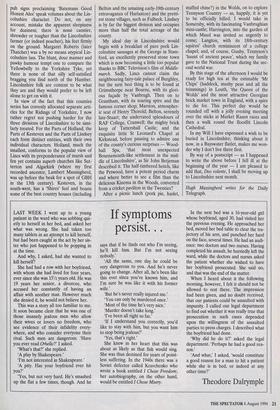If symptoms
persist.. .
LAST WEEK I went up to a young patient in the ward who was sobbing qui- etly to herself in her bed, and asked her what was wrong. She had taken too many tablets in an attempt to kill herself, but had been caught in the act by her sis- ter who just happened to be popping in at the time.
And why, I asked, had she wanted to kill herself?
She had had a row with her boyfriend, with whom she had lived for four years, ever since she was 15 Vz years old. He was 19 years her senior, a divorcee, who accused her constantly of having an affair with another man. However much she denied it, he would not believe her.
This was a story all too familiar to me. It soon became clear that he was one of those insanely jealous men who allow their wives or lovers no freedom, who see evidence of their infidelity every- where, and who consider everyone their rival. Such men are dangerous. 'Have you ever read Othello?' I asked.
What's that?' she replied.
`A play by Shakespeare.'
`I'm not interested in Shakespeare.'
`A pity. Has your boyfriend ever hit you?'
`Yes, but not very hard. He's smashed up the flat a few times, though. And he says that if he finds out who I'm seeing, he'll kill him. But I'm not seeing nobody.'
`All the same, one day he could be very dangerous to you. And he's never going to change. After all, he's been like this ever since you've known him, and I'm sure he was like it with his former wife.'
`But he's never really injured me.' `You can only be murdered once.' `Most of the time he's very nice.' `Murder doesn't take long.'
`I've been all right so far.'
'If I understand you correctly, you'd like to stay with him, but you want him to stop being jealous?'
`Yes, that's right.'
She knew in her heart that this was about as likely as that fish would sing. She was thus destined for years of point- less suffering. In the 1940s there was a Soviet defector called Kravchenko who wrote a book entitled I Chose Freedom; her autobiography, on the other hand, would be entitled I Chose Misery. In the next bed was a 16-year-old girl whose boyfriend, aged 30, had visited her the previous evening. He approached her bed, moved her bed table to clear the tra- jectory of his arm, and punched her hard on the face, several times. He had an audi- ence: two doctors and two nurses. Having completed his assault, he hurriedly left the ward, while the doctors and nurses asked the patient whether she wished to have her boyfriend prosecuted. She said no, and that was the end of the matter.
When I heard about it the following morning, however, I felt it should not be allowed to rest there. The impression had been given, and no doubt received, that our patients could be assaulted with impunity. I called our legal department to find out whether it was really true that prosecution in such cases depended upon the willingness of the assaulted parties to press charges. I described what the boyfriend had done.
`Why did he do it?' asked the legal department. 'Perhaps he had a good rea- son.'
`And what,' I asked, 'would constitute a good reason for a man to hit a patient while she is in bed, or indeed at any other time?'
Theodore Dalrymple


















































 Previous page
Previous page